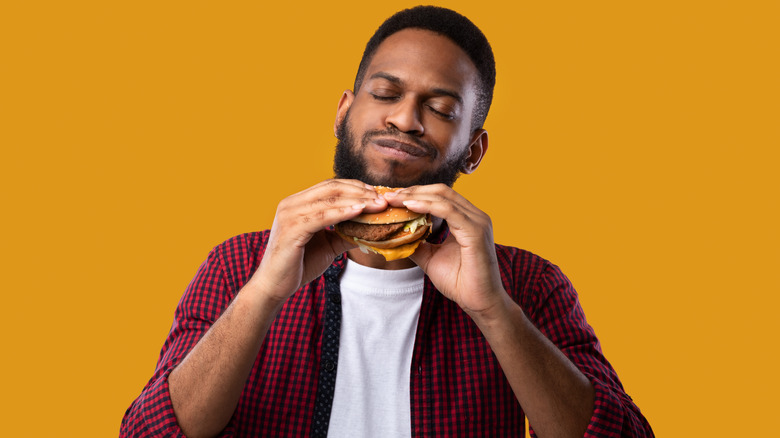How Does Your Body Know When Your Stomach Is Full?
If you've ever eaten a large meal in a short period of time and still felt hungry afterward, you're not alone. Despite what or how much you've eaten, it may take up to 20 minutes before your brain to realizes that your stomach is full (via LiveStrong). But how exactly does this happen? Well, satiety, or feeling full, is determined by the gut-brain connection.
"Generally, the body starts to produce ghrelin, known as the hunger hormone, and signals to the brain that food or water is required," Jonathan Purtell, a registered dietitian with Lenox Hill Hospital in New York City, told LiveStrong. "Once food is ingested, the production of enzymes and hormones leads to the cessation of ghrelin production and starts to send satiety signals to the brain." In other words, your body begins breaking down and digesting food as soon as you start eating.
While your stomach is in constant communication with your brain while you're eating and digesting, it can take up to 20 minutes after your first bite for satiety signals to be processed. This isn't the only way your body known your stomach is full, however. Your stomach's stretch receptors also signal to your brain that your stomach is full when it expands to make room for more food. These receptors tell your brain that it's time to stop eating.
How to feel full more quickly
If you don't feel full or satisfied after eating, however, you might not be eating enough high-satiety foods (via Insider). If you're looking to feel full more quickly and prevent yourself from overeating, you can try adding more fiber, protein, and healthy fats to your daily diet.
"Fiber (veggies, fruit, whole grains) is what will give our meal bulk and substance, protein (legumes, seeds, eggs, fish, chicken/meat, dairy) will give us that satisfied feeling, and healthy fat (nuts, seeds, avocado, olive oil) will keep us feeling satiated for the longest amount of time," Brigitte Zeitlin, a registered dietician and the owner of BZ Nutrition, told Insider. These types of foods generally take longer to digest, which can help satiate your hunger and keep you feeling full for longer periods of time.
Believe it or not, drinking more water can also help keep you from feeling hungry after eating a meal. If you don't drink enough water throughout the day, your body may accidentally mistake thirst for hunger. Making sure you drink 8 to 10 glasses of water per day can help prevent this from happening. Another way to feel full more quickly is to take your time and eat slowly. Eating at a slower pace can give your brain enough to catch up with your stomach. This can stop you from overeating and help you feel more satisfied after finishing a meal.


